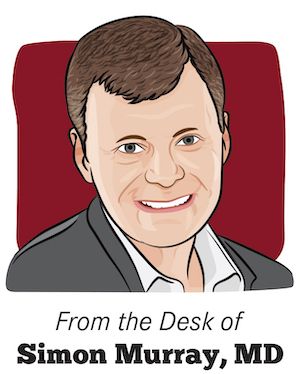Simon Murray, MD: AAD 2019 Sessions to Attend
An internist’s perspective on which sessions to attend, from melanoma to inflammatory diseases to cosmetic procedures.

It’s an exciting time in dermatology with a whole new set of available tools to treat and potentially cure previously difficult to treat diseases. As an internist, I have often viewed dermatology as a specialty with few emergencies, and one that offered little beyond old and unproven therapies. The saying in medical school was that there were 4 rules to learning about dermatology:
If a lesion is wet: dry it.
If a lesion dry: wet it
If a patient is on steroids: take them off steroids.
If a patient is not on steroids: put them on steroids.
Things in 2019 are certainly different, beginning with targeted therapies for melanoma, psoriasis, inflammatory diseases, and acne, and advances in cosmetic procedures.
The 2019 Annual Meeting of the American Academy of Dermatology (AAD) offers state of the art information on all of the important topics in dermatology. The subjects are discussed in a variety of forums and are available over several days by different speakers, so if you miss a lecture on melanoma you will be sure to find another lecture on a different day or time. If you miss a lecture you are sure to find a similar discussion on another day, which means you will in most cases have multiple opportunities to learn about a topic that interests you. I have highlighted only a small number of lectures that are available, but there is so much more.
The most notable advancement in dermatology in my opinion is in the treatment of malignant melanoma using targeted immunotherapy. The newest data on treatment of advanced melanoma is remarkable and worth learning about. There are also targeted therapies for advanced squamous cell cancer. Other exciting advances in melanoma include innovations in melanoma diagnosis as well as the growing field of genomic profiling.
An “Approach to Pigmented Lesions” (F037) will provide some insight into diagnosis melanoma in a forum from 3:30 to 5:30pm on Friday afternoon. “Updates in Melanoma Diagnosis and Therapy” (S022) will be presented Saturday from 9am to noon. Cutaneous malignancy will be covered in the discussion “Novel Therapies for Cutaneous Malignancies: What's New and What's Ahead” (F060) on Saturday 1pm to 3pm. On Sunday, “Managing Melanoma” will be offered at 3:30pm.
Another exciting development has been the discovery that the inflammatory skin diseases like psoriasis are immune mediated and can be treated with targeted therapies. This has led to cures in some cases, which 10 years ago would have been impossible to imagine. This provided more insight into other inflammatory skin diseases like atopic dermatitis, alopecia areata, vitiligo, and hidradenitis suppurativa. The first biologic treatment, dupilumab, has produced excellent results in atopic dermatitis—better than any previous treatment.
Biologic treatments are being studied in all the inflammatory skin diseases and will be presented in Friday’s symposium “Inflammatory Skin Diseases: The Translational Revolution from 1pm to 4pm. The discussion “Management of Hormonal and Metabolic Dysregulation in Hidradenitis Suppurativa” (U019) will be offered at 4:30pm on Friday. Atopic dermatitis has some promising new therapies and will be discussed Saturday at 9am in “Atopic Dermatitis” (F051).
As in other fields of medicine the introduction of AI has improved our ability to diagnose disease. Current data suggests that AI is equal to or better than diagnosing melanoma than most dermatologists. Along with AI the promise of virtual diagnosis will enhance the ability to diagnose and treat a wider number of patients. On Saturday, a symposium will be held at 3:30pm on “Predicting the Future: AI, Machine Learning, and Dermatology” (D004).
Newer treatments for cosmetic problems that provide comfort to millions of sufferers will be covered in detail throughout the weekend. “Controversies in Acne and Rosacea” will be presented on Saturday at 9am. Also at 9am on Saturday will be “Dermatologic surgery: Cosmetic Tips and Pearls” (S020). On Sunday morning at 7:30am, “Top 10 Cosmetic Procedure Complications and How to Fix Them” will be presented. Later that afternoon at 3:30pm, “The Science of Cosmeceuticals and Nutraceuticals” (F104) will give an overview of the role of these products.
There is something here at the 2019 AAD Annual Meeting for everyone, and I know that dermatologists as well as primary care providers will learn things they need to improve the care of their patients.